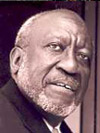| Home | Blog | Ask This | Showcase | Commentary | Comments | About Us | Contributors | Contact Us |

Government reduces in-prison education even though it helps lower recidivismASK THIS | July 211, 2005John Britton offers guidance on a story begging to be reported wherever there’s a prison, or ex-offenders. By John Britton
Q. Will federal lawmakers consider appropriating funds to the states earmarked for establishing or re-establishing higher education opportunities in prison?
Q. Will lawmakers enact legislation mandating postsecondary education as an option for every prisoner in the federal prison system?
Prison populations are soaring, with in excess of 2 million persons incarcerated. Much of that population includes repeat offenders whose recidivism poses an enormous burden on state budgets nationwide. While some public policy makers view a return to rehabilitative strategies as the answer to the danger and daunting costs of career criminality, lawmakers at the federal and state levels often seem addicted to punitive practices. The elephant in rehabilitation – higher education – is being pretty much ignored, so far. Few people in prison hold baccalaureate degrees. On the other hand, almost every study of recidivism suggests that reading, writing and computing are skills that most perpetrators of violent crimes do not have. Aftercare personnel agree that substance abusers, by and large, report one thing in common that propelled them toward anti-social behavior: shame at their inability to read and write. As late as the early nineties, several colleges and universities, as well as a smattering of community colleges, offered academic programs in prisons leading to associate and bachelor's degrees. Some even offered access to master’s degrees. For various reasons (mostly shortsighted complaints of prisoner privilege), most of those opportunities have disappeared, notwithstanding statistical evidence that graduates of those programs seldom return to a life of crime. Legislators have deliberately reduced education opportunities for the prison population and for ex-offenders. For example, Congress denied Pell Grants to would-be prison scholars. Ex-felons are ineligible for federal student aid to fulfill any educational aspirations. In the former instance, jurisdictions without the means to squeeze prison college programs into lean state budgets can no longer anticipate that their imprisoned higher education aspirants can attract federal grants to pay college tuition. In the latter, ex-offenders with the intelligence and the motivation to enroll in a college of choice are denied access to the “union card” that is most successful at opening doors to legitimate employment.
Possible sources for comment Dr. Andress Taylor, Department of English, University of the
|
|||||||||||||



